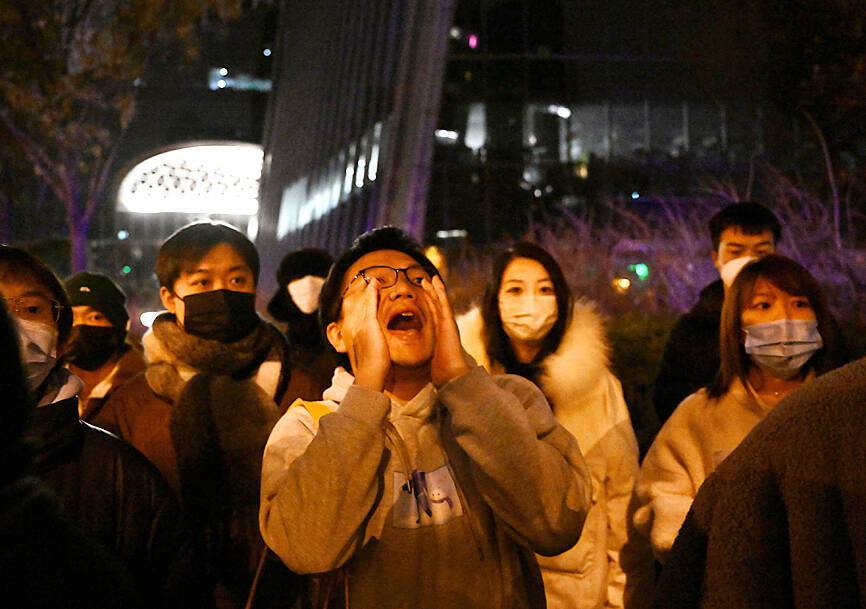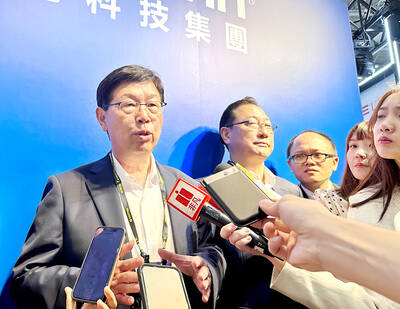Chinese assets slumped yesterday as a sense of chaos and uncertainty gripped traders after growing protests against COVID-19 curbs complicated the nation’s path to reopening.
Chinese stocks were among the worst performers in Asia yesterday as investors trimmed holdings, concerned that the protests are creating more uncertainty for the nation’s path toward reopening.
The benchmark CSI 300 Index ended the day 1.1 percent lower, the biggest drop in a month.

Photo: AFP
The onshore yuan weakened 0.5 percent to 7.1991 per US dollar yesterday, after depreciating by 1.1 percent in early morning trading.
Protests spread over the weekend as people in major cities including Beijing and Shanghai took to the streets to express their anger over the nation’s COVID-19 controls.
The rare show of defiance is raising the threat of a government crackdown, prompting investors to rethink their bets after jumping back in on reopening hopes.
“We might see some de-risking around Chinese markets,” Pepperstone Group Ltd research head Chris Weston said.
“We are seeing some outflows of the offshore yuan, which I think is a pretty good indication of how Chinese markets may fare,” he added.
Goldman Sachs Group Inc forecasts a 30 percent probability of China reopening before the second quarter of next year, saying there is a chance of a “disorderly” exit.
“The central government may soon need to choose between more lockdowns and more COVID outbreaks,” Goldman Sachs chief China economist Hui Shan (閃輝) wrote in a note late on Sunday.
Local governments have struggled to “balance quickly” controlling the spread of the virus while obeying recent measures mandating a more targeted approach, she said.
Reopening stocks, including airlines and restaurants, proved relatively resilient in yesterday’s selloff, with Haidilao International Holding Ltd (海底撈) posting gains.
The moves underscore a mixed response among traders, as some brush aside the social unrest and focus more on the eventual “zero COVID-19” exit. Some market watchers are betting the swelling protests could even accelerate a loosening of restrictions.
“The protests create uncertainty, but the destination of opening up has been set since the party congress,” GAM Hong Kong Ltd investment manager Robert Mumford said.
“One suspects this sort of public pressure might encourage a faster pace of opening which would be a positive, but it remains to be seen how the authorities react to recent events,” he said.
Foreign investors were net sellers of 6 billion yuan (US$833 million) of onshore shares so far in yesterday’s session through trading links with Hong Kong.
China’s credit markets slid at yesterday’s open, as the spreads on investment-grade US dollar notes over Treasuries widened as much as 10 basis points, credit traders said.
Dollar bonds of some Chinese property firms, including Country Garden Holdings Co (碧桂園) and Longfor Group Holdings Ltd (龍湖地產), snap a three-day rally.
“Assuming the COVID policy would not change much, and we cannot rule out the risk that it gets tougher, the government will likely inject more liquidity to cool down the bond yields,” Natixis SA senior economist Gary Ng (吳卓殷) said in Hong Kong.
“However, this will not be enough to calm the market,” he added.

Taiwan Transport and Storage Corp (TTS, 台灣通運倉儲) yesterday unveiled its first electric tractor unit — manufactured by Volvo Trucks — in a ceremony in Taipei, and said the unit would soon be used to transport cement produced by Taiwan Cement Corp (TCC, 台灣水泥). Both TTS and TCC belong to TCC International Holdings Ltd (台泥國際集團). With the electric tractor unit, the Taipei-based cement firm would become the first in Taiwan to use electric vehicles to transport construction materials. TTS chairman Koo Kung-yi (辜公怡), Volvo Trucks vice president of sales and marketing Johan Selven, TCC president Roman Cheng (程耀輝) and Taikoo Motors Group

Among the rows of vibrators, rubber torsos and leather harnesses at a Chinese sex toys exhibition in Shanghai this weekend, the beginnings of an artificial intelligence (AI)-driven shift in the industry quietly pulsed. China manufactures about 70 percent of the world’s sex toys, most of it the “hardware” on display at the fair — whether that be technicolor tentacled dildos or hyper-realistic personalized silicone dolls. Yet smart toys have been rising in popularity for some time. Many major European and US brands already offer tech-enhanced products that can enable long-distance love, monitor well-being and even bring people one step closer to

RECORD-BREAKING: TSMC’s net profit last quarter beat market expectations by expanding 8.9% and it was the best first-quarter profit in the chipmaker’s history Taiwan Semiconductor Manufacturing Co (TSMC, 台積電), which counts Nvidia Corp as a key customer, yesterday said that artificial intelligence (AI) server chip revenue is set to more than double this year from last year amid rising demand. The chipmaker expects the growth momentum to continue in the next five years with an annual compound growth rate of 50 percent, TSMC chief executive officer C.C. Wei (魏哲家) told investors yesterday. By 2028, AI chips’ contribution to revenue would climb to about 20 percent from a percentage in the low teens, Wei said. “Almost all the AI innovators are working with TSMC to address the

FUTURE PLANS: Although the electric vehicle market is getting more competitive, Hon Hai would stick to its goal of seizing a 5 percent share globally, Young Liu said Hon Hai Precision Industry Co (鴻海精密), a major iPhone assembler and supplier of artificial intelligence (AI) servers powered by Nvidia Corp’s chips, yesterday said it has introduced a rotating chief executive structure as part of the company’s efforts to cultivate future leaders and to enhance corporate governance. The 50-year-old contract electronics maker reported sizable revenue of NT$6.16 trillion (US$189.67 billion) last year. Hon Hai, also known as Foxconn Technology Group (富士康科技集團), has been under the control of one man almost since its inception. A rotating CEO system is a rarity among Taiwanese businesses. Hon Hai has given leaders of the company’s six